Hong Kong police fire rubber bullets as they take fight to protesters at university campus
China has given a stark warning to Western countries to butt out of their “internal affairs” as police tightened their siege of a university campus in Hong Kong. SEE THE PHOTOS
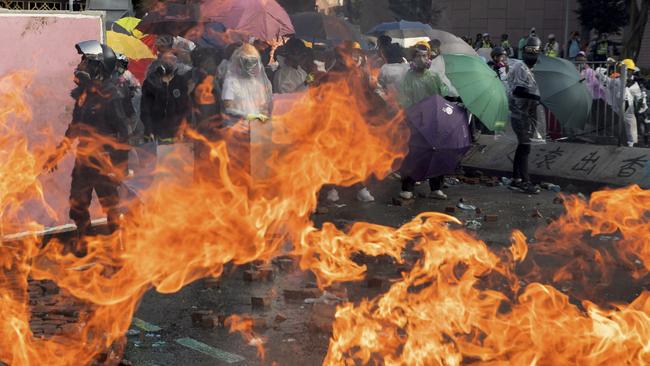
World
Don't miss out on the headlines from World. Followed categories will be added to My News.
China’s ambassador to London has accused foreign countries including the United States and Britain of interfering in Chinese internal affairs through their reactions to the violent clashes taking place in Hong Kong.
The Asian financial hub, which was handed over to China by former colonial ruler Britain in 1997 but enjoys a degree of autonomy under the “one country, two systems” formula, has been plunged into chaos for almost six months.
In a dramatic escalation, Hong Kong police are laying siege to a university in Hong Kong, firing rubber bullets and tear gas to push back anti-government protesters armed with petrol bombs and other weapons to stop them from fleeing.
In London, ambassador Liu Xiaoming called a news conference at the Chinese embassy to comment on events in Hong Kong and criticise Western governments and media for their responses to the crisis.

“Some Western countries have publicly supported extreme violent offenders,” he said. “The US House of Representatives adopted the so-called Hong Kong Human Rights and Democracy Act to blatantly interfere in Hong Kong affairs, which are China’s internal affairs.
“The British government and the foreign affairs committee of the House of Commons published China-related reports making irresponsible remarks on Hong Kong,” he said.
Mr Liu also said that by criticising violent actions by the authorities as well as by the protesters, Britain was in effect taking sides.
“I think when the British government criticises Hong Kong police, criticises the Hong Kong government in handling the situation, they are interfering into China’s internal affairs,” he said. “They look like they are balanced but as a matter of fact they are taking sides. That is our position.”
The ambassador also attacked Western media, saying that reporting on Hong Kong was misleading and did not give enough prominence to violence perpetrated by the protesters.
He also dismissed Western media reports on the separate issue of what UN experts and activists condemn as repression in China’s western Xinjiang region as “pure fabrication”.
RIOT POLICE DESCEND ON CAMPUS
It came as riot police in Hong Kong descended on a university campus held by protesters after an all-night siege where violence erupted with rubber bullets, tear gas and water canonns being fired.
Anti-government protesters barricaded themselves inside Hong Kong Polytechnic University for days, fighting back with gasoline bombs and bows and arrows.
Police surrounded the area and began moving in after issuing an ultimatum for people to leave the area. The crowd wore raincoats and carried umbrellas to shield themselves.
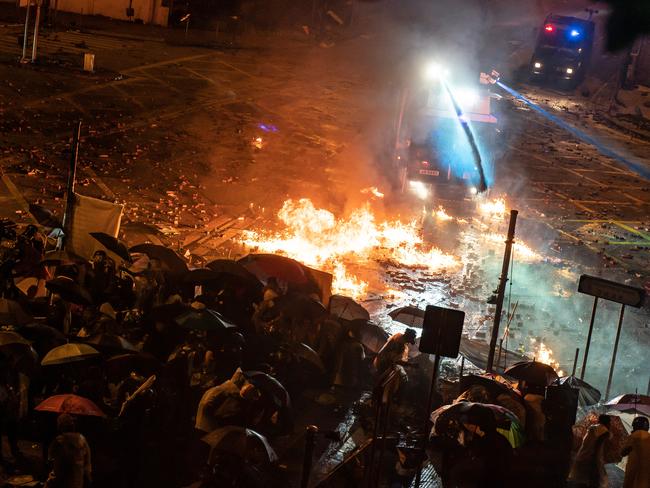
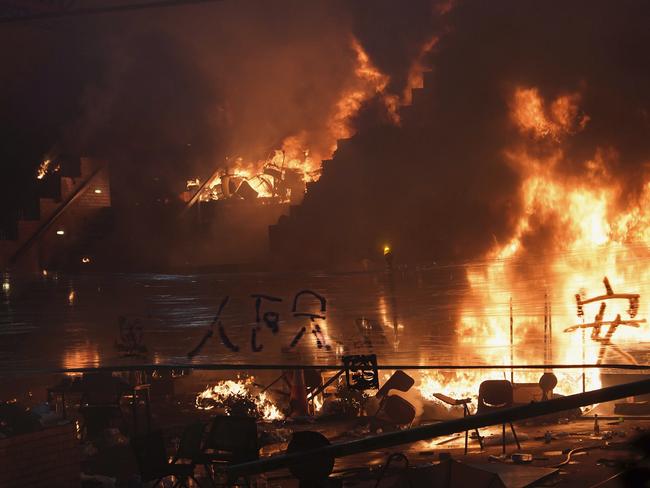
Riot officers broke in before dawn as fires raged inside and outside the school. Earlier in the day, protesters used bows and arrows, and one arrow struck a media liaison officer in the calf.
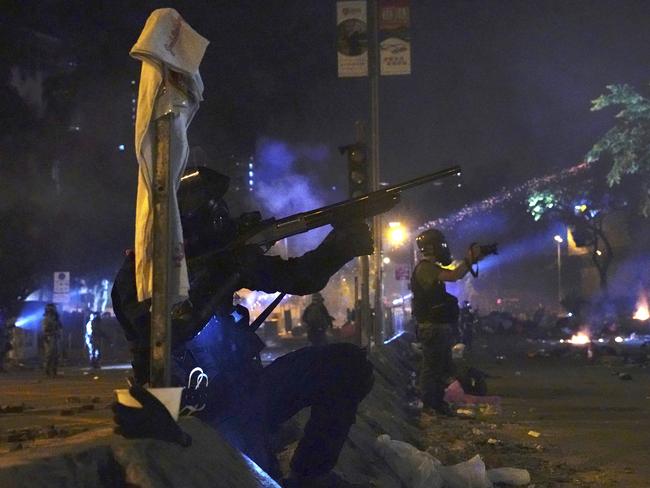
Photos on the department’s Facebook page show the arrow sticking out of the back of the officer’s leg through his pants. As riot police moved in from all sides, some protesters retreated inside the university. Others set fires on bridges leading to it.

A huge blaze burned along much of a long footbridge that connects a train station to the campus over the approach to the Cross-Harbour Tunnel, a major road under Hong Kong’s harbour that has been blocked by the protesters for days.

The use of bows and arrows and catapult-launched gasoline bombs threatened to escalate the violence in the more than five-month anti-government movement.
Protesters are trying to keep the pressure on Hong Kong leaders, who have rejected most of their demands.
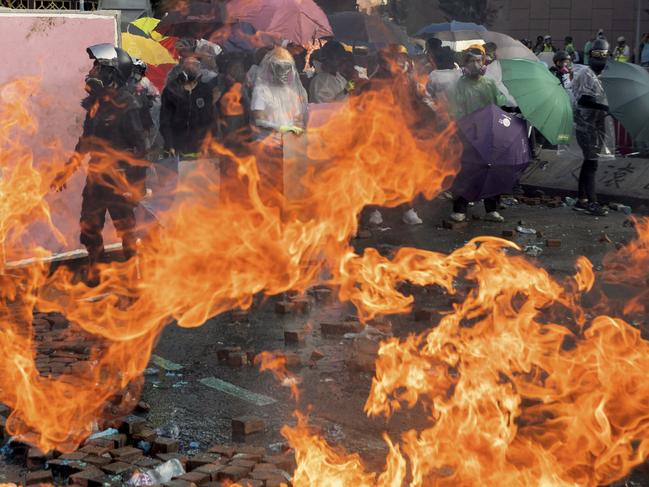
The protests were sparked by proposed legislation that would have allowed the extradition of criminal suspects to the mainland. Activists saw it as an erosion of Hong Kong’s autonomy under the “one country, two systems” formula implemented in 1997, when Britain returned the territory to China.
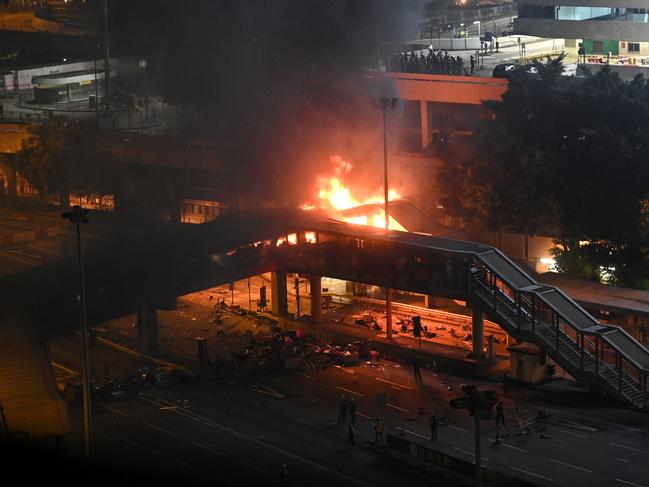
The bill has been withdrawn, but the protests have expanded into a wider resistance movement against what is perceived as the growing control of Hong Kong by Communist China, along with calls for full democracy for the territory.
Several hundred people formed a human chain Sunday in central Hong Kong in a peaceful rally in support of the movement.
Azaze Chung, a university student, said the government should respond to the protesters’ demands, not just use force against them.
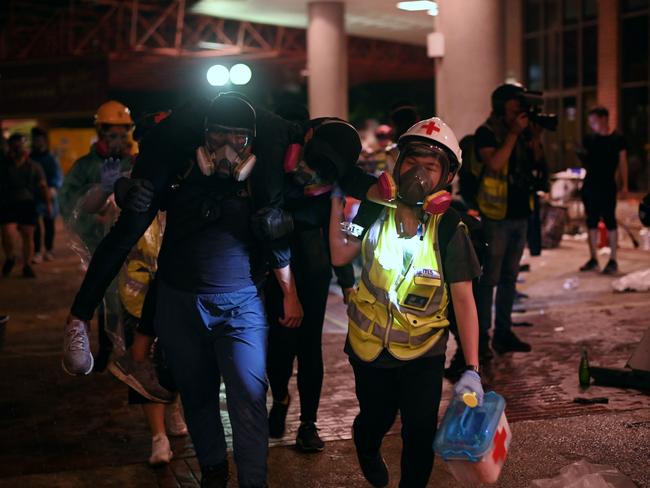
Police and protesters faced off all day outside Polytechnic after a pitched battle the previous night in which the two sides exchanged tear gas and gasoline bombs that left fires blazing in the street.
A large group of people arrived in the morning to try to clean up the road but were warned away by protesters. Riot police shot several volleys of tear gas at the protesters, who sheltered behind a wall of umbrellas and threw gasoline bombs into nearby bushes and trees, setting them on fire.
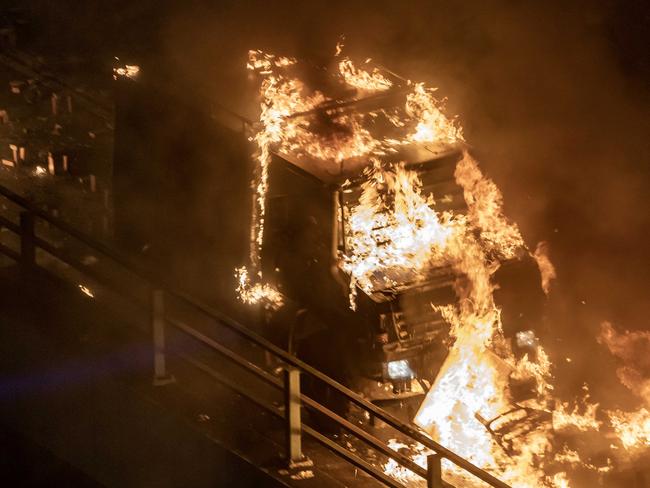
The protesters held their ground for most of the day, as water cannon trucks drove over bricks and nails strewn by protesters to spray them at close range - some with water dyed blue to help police identify protesters afterward. Protesters began retreating into the university near sunset, fearing they would be trapped as police approached from other directions. The protesters barricaded the entrances to the campus and set up narrow access control points. They are the holdouts from larger groups that occupied several major campuses for much of last week.

Another group threw bricks in the street to block a main thoroughfare in the Mongkok district, as police fired tear gas to try to disperse them. The disruption to Nathan Road traffic may have been an attempt to distract police during the standoff at Polytechnic.
Opposition lawmakers criticized the Chinese military for joining a cleanup to remove debris from streets near Hong Kong Baptist University on Saturday.
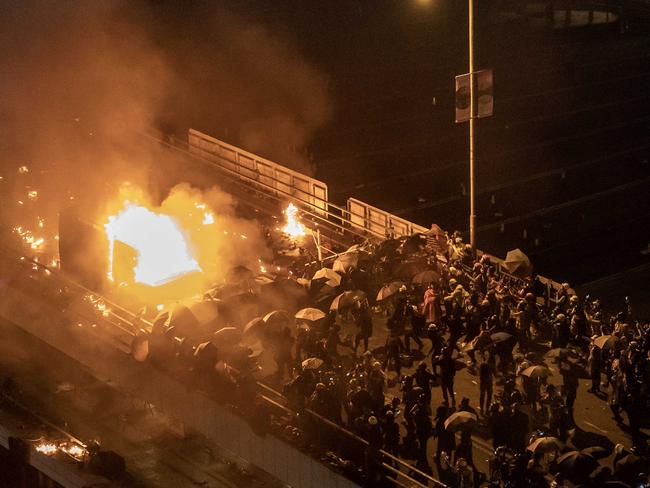
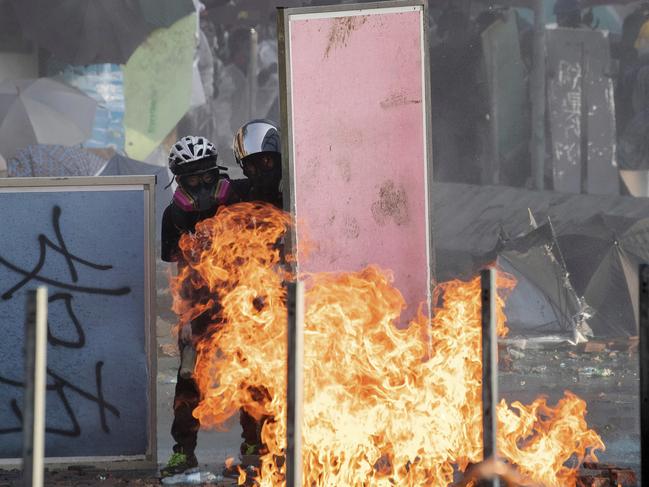
Dozens of Chinese troops, dressed in black shorts and olive drab T-shirts, ran out in loose formation and picked up paving stones, rocks and other obstacles that had cluttered the street.
The military is allowed to help maintain public order, but only at the request of the Hong Kong government.
The government said that it had not requested the military’s assistance, describing it as a voluntary community activity.
The Education Bureau announced that classes from kindergarten to high school would be suspended again on Monday because of safety concerns.
Classes have been cancelled since Thursday, after the bureau came under criticism for not doing so earlier.
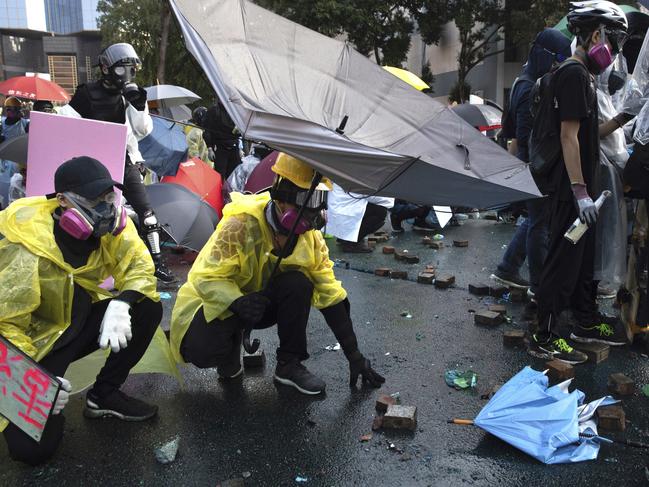

CHINESE SOLDIERS ENTER HONG KONG
Jogging in ranks, energetically clearing bricks, barriers and debris in a choreographed action as swift as it was disciplined, opinions were divided over the sudden appearance of Chinese soldiers on Hong Kong’s streets on Saturday.
The debut of plainclothes soldiers from a Chinese PLA barracks in Kowloon Tong was welcomed by some as a timely demonstration of order and power, in a city caught in a near six-month crisis.
“Very good, they’re helping the weak and poor,” a man who gave his name as Chu said, adding the protests had gone too far.
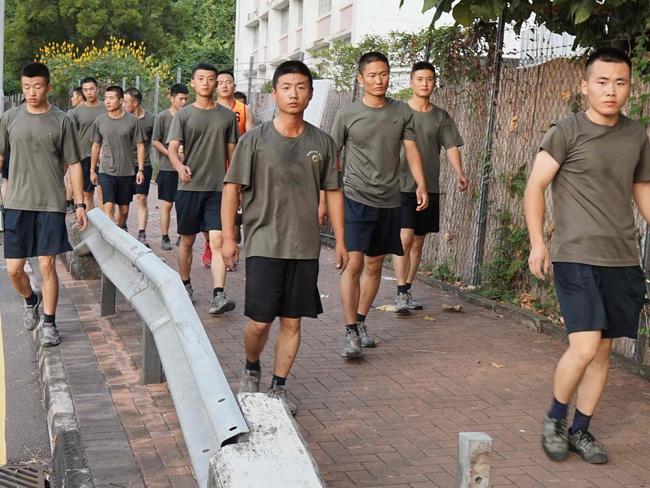
“We can’t even walk on the roads, old grannies can’t go to the doctor, they’re (the protesters) breaking all this stuff but I have to pay for it with my taxes.” Others perceived the clean-up as a warning to Hong Kong’s pro-democracy protesters, in a city rocked by a week of intensified violence and chaos.
“We could get in big trouble,” said a 24-year-old student demonstrator who identified himself by the surname Leung.
Politician Claudia Mo urged the city to “stay alert” following the “political PR show”.
The protests are framed by fears Beijing may deploy its security forces to quell the billowing unrest.

Article 14 of the Basic Law – Hong Kong’s mini-constitution since its handover from Britain to China in 1997 – allows the local government to request help from PLA garrisons in the city in the event of a public order breakdown.
During the clean-up, the men occasionally broke off to form ranks and take orders, all under the lens of an accompanying military cameraman, before throwing bricks to the roadside and loading red buckets and trolleys with debris before pouring it into skips.
Others swept up after them with brooms and shovels in a tightly-organised exercise lasting less than an hour.
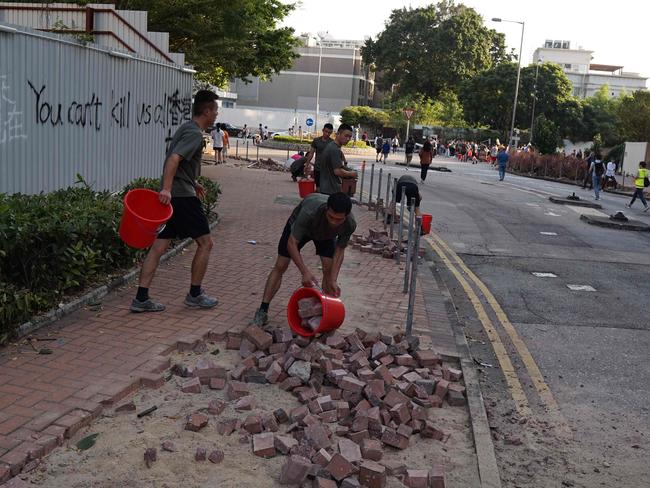
Once each group had finished, they ran back into the barracks in ranks, shouting loudly in Mandarin: “One, two, three, four.” A group of people came out to applaud shouting “Hong Kong add oil”, recasting a slogan of encouragement made famous by pro-democracy protesters to support the government side.
China’s propaganda machine has consistently warned protesters a tough security response is looming.
Political analyst Dixon Sing said the intervention was “symbolic” because of the barracks’ proximity to the roadblocks.
“So I’m not quite sure if the PLA will extend their action similar to what we have seen to other areas,” he said. “We will have to wait and see.”
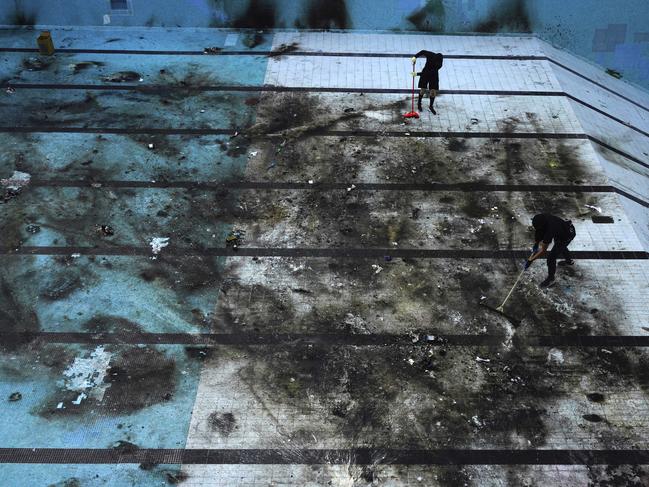
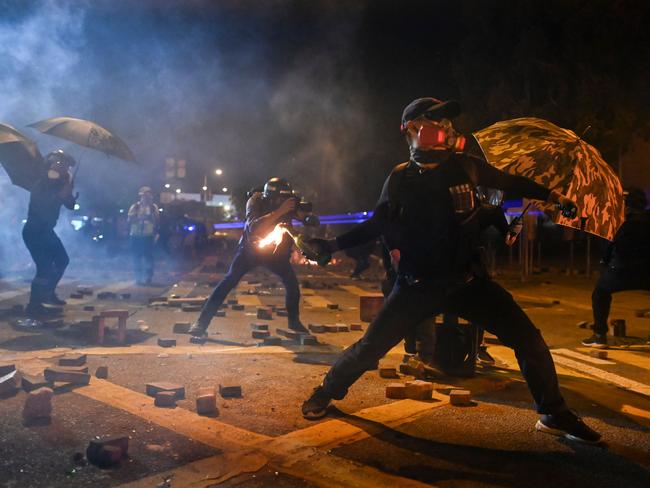

Opposition politicians criticised the Chinese military for joining a clean-up. The military is allowed to help maintain public order, but only at the request of the Hong Kong government. The government said that it had not requested the military’s assistance, describing it as a voluntary community activity.
The Education Bureau announced that classes from kindergarten to high school would be suspended again on Monday because of safety concerns. Classes have been cancelled since Thursday, after the bureau came under criticism for not doing so earlier.
HONG KONG PROTESTERS DEFY XI JINPING
Hong Kong pro-democracy protesters defied a warning by China’s President Xi Jinping and took to the streets with renewed vigour again as the political turmoil seeped out to London where a minister from the territory was confronted by masked demonstrators.
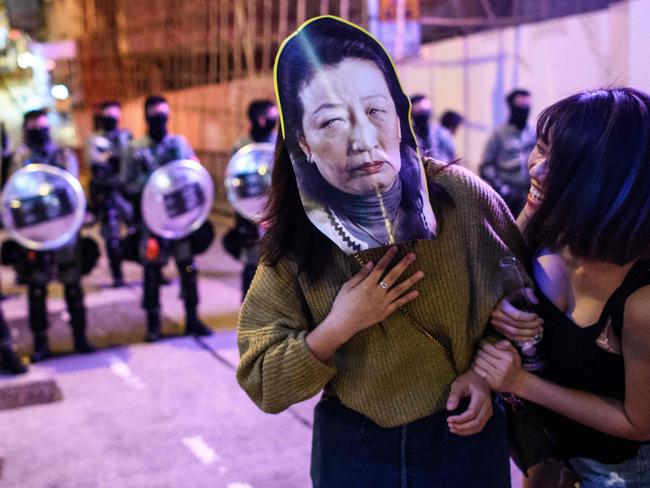
Hong Kong Justice Secretary Teresa Cheng fell in London after being surrounded by pro-democracy protesters, in the most physical confrontation involving a member of cabinet since the unrest began.
Ms Cheng walked away without any visible signs of injury.
But China called it an “appalling attack” and accused Britain of fuelling the protest movement. Police in London said they were investigating the incident.
Former colonial power Britain has urged Beijing and Hong Kong to seek a political solution to the city’s crisis and has condemned the escalating violence on both sides.
In a briefing in Beijing, Chinese foreign ministry spokesman Geng Shuang said if the UK “continues to add fuel to the fire … then it will bring calamity on itself.”
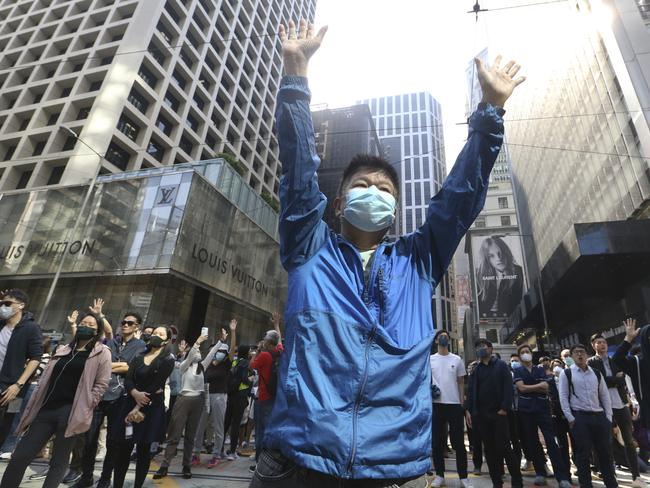
It comes as Hong Kong has confirmed its economy plunged into its first recession in a decade in the third quarter, weighed down by increasingly violent anti-government protests and the escalating US-China trade war.
The economy shrank by a seasonally adjusted 3.2 per cent in July-September from the previous quarter, in line with a preliminary reading, revised government data showed.
MORE NEWS:
Gunman at large in school shooting
Brexit Party rejects Boris’ deal
Batty: Spicer should stop blaming others
Gross domestic product contracted for the second consecutive quarter, meeting the technical definition of a recession.
From a year earlier, the economy contracted 2.9 per cent, the same as the preliminary drop. The readings were the weakest since the global financial crisis in 2008-09.
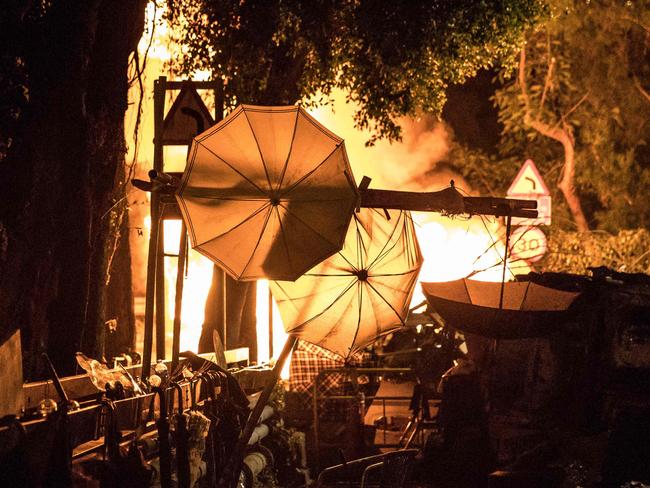
Months of confrontation between police and protesters have plunged the financial and trading hub into its worst crisis since it reverted from British to Chinese rule in 1997.
Tourists are cancelling bookings, retailers are reeling from a sharp drop in sales and the stock market is faltering, adding to pressure the city is feeling from China’s economic slowdown and the prolonged Sino-US trade dispute.
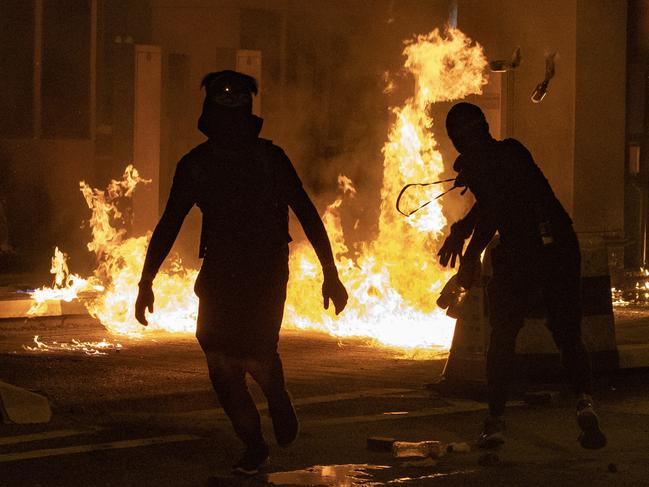
It comes as China today condemned an incident in which Hong Kong’s justice secretary was jostled by masked demonstrators in London, and accused Britain of fuelling pro-democracy unrest.
“If the British side does not change its wrong practices, and continues to add fuel to the fire, sow discord and instigate others, and make false countercharges, then it will bring calamity on itself,” foreign ministry spokesman Geng Shuang said.
In another development, protesters who barricaded themselves in a Hong Kong university this week have begun to leave.

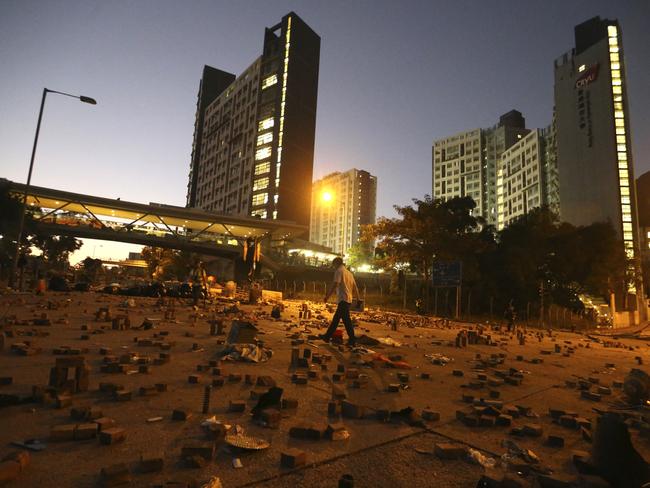
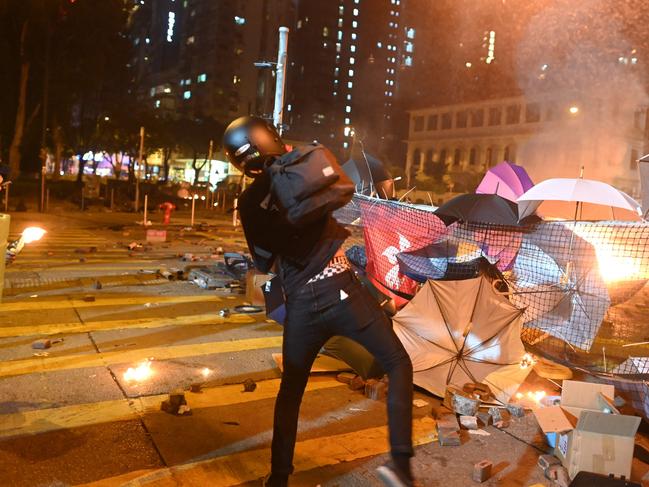
Xi said Beijing “firmly supports” Hong Kong’s government and police and that “stopping violence and controlling chaos while restoring order is currently Hong Kong’s most urgent task,” the People’s Daily reported.
Recent actions by protesters have “seriously challenged the baseline principle of ‘one country, two systems’”, Xi said in rare comments on the violence in Hong Kong at a summit of BRICS countries in the Brazilian capital of Brasilia.
Protests have rocked Hong Kong for nearly six months.
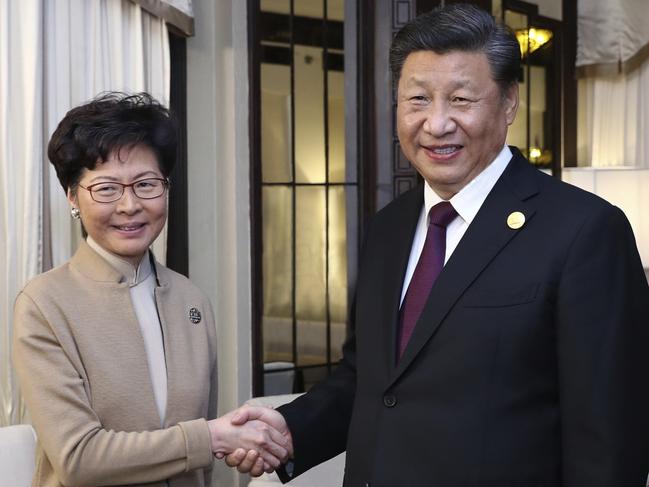
Initially focused on opposition to a proposed extradition law, protesters’ demands have evolved into broader calls for democracy and investigations into police violence.
Hong Kong was handed back to China by the British in 1997 under a “one country, two systems” policy which gives the territory rights unseen on the mainland — freedoms protesters say are being steadily eroded by Beijing.
Clashes between protesters and police escalated after the recent death of a student who succumbed to head injuries sustained during a fall as police skirmished with demonstrators inside a car park.
Originally published as Hong Kong police fire rubber bullets as they take fight to protesters at university campus
